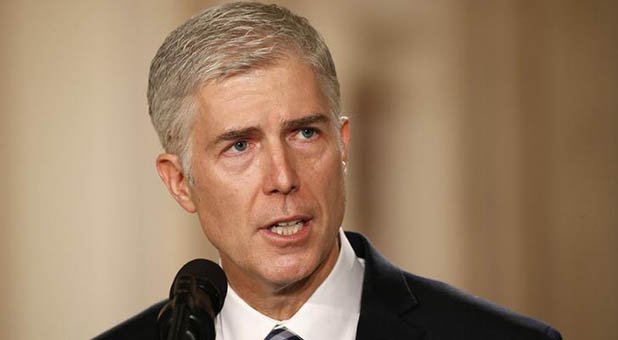Natural Law Has a Lot to Say About Judges’ Authority
In a recent article for Public Discourse, Acton’s director of research, Samuel Gregg, speculates on the role of natural law—specifically New Natural Law Theory—in influencing, Neil Gorsuch’s exercise of judicial power in light of the constitution. Gregg asks two fundamental questions:
No one can predict with certainty Gorsuch’s take on any question on which he might be called to deliberate if he receives Senate confirmation. But before too much ink is spilled speculating on whether natural law in general or NNLT in particular will influence Gorsuch’s thought, it is worth reflecting on two important prior questions. How does natural law theory view constitutionalism? And what does this mean for the exercise of judicial power?
Gregg addresses the purpose of the constitution as not just a “type of power map” without reference to natural law, but an instrument in promoting the common good. He says:
But in his 1998 book An Introduction to Constitutional Law (published in the same series as Natural Law and Natural Rights), Eric Barendt notes that constitutions are more than a type of power map. For if this were the sole purpose of constitutions, it would be possible for a tyrannical regime to comply formally with constitutional law while carrying out fundamentally unjust policies.
In other words, constitutions have purposes that go beyond saying who may do what. In the American Constitution’s case, one such goal is to limit the exercise of political authority. At the time of its drafting, a major focus was on limiting the powers of the states. But the Constitution also seeks to establish barriers to despotism through dividing power, establishing checks and balances and specifying protections for particular liberties, especially through the Bill of Rights.
At no point, however, does the Constitution guarantee the realization of happiness by any Americans. Instead it helps to promote what NNLT describes as an instrumental common good rather than a common good that is an all-encompassing end in itself. This instrumental common good concerns particular conditions that must prevail in a community if people are to flourish. When the rule of law, for example, is absent from a community, it becomes much more difficult for all individuals and associations in that community to pursue their legitimate ends.
The Constitution is not the arbiter of happiness in the United States, nor does Gregg see it as a document written without intention open to manipulation and abuse of the common good in its interpretation, but instead he sees the Constitution as an instrument in upholding the common good rooted in natural law. The question that arises then is how does this upholding of the common good relate to governmental operation and judicial power? Gregg says:
This leaves unanswered the question of what natural law theory says about how we limit the state’s powers. As Robert P. George writes, natural law theory holds that positive law, including constitutional law, is always derived in some way from the natural law. Sometimes this is relatively direct: the wrongness of murder, for instance, translates quickly into the laws that prohibit and punish murder.
… A similar point can be made about the scope of judicial review accorded by a constitution to judges. Take the case of a constitution being developed in a community in which natural law and natural rights are self-evident to those drafting and ratifying the constitution. Let’s also assume that the drafters expect the community’s political life to continue to reflect a commitment to natural rights and natural law.
… The constitution’s designers may determine that the legislature rather than the judiciary should have the primary responsibility for assuring that laws do not violate the logic and morality of natural law or the freedoms embodied in natural rights. This would mean that judges who presumed to take such a primary role upon themselves, rather than confining themselves to acting according to the constitution’s intent and text, would be acting in a lawless manner.
This would still be the case if the cause—such as protecting innocent life—were good. George reminds us that all public officials in a reasonably just regime have “a duty in justice to respect the constitutional limits of their own authority,” not least because respect for the rule of law … is itself a requirement of natural law.
Failure to operate according to one’s specific powers, even in a desire to promote the common good in conformation to natural law, is ultimately a form of lawlessness, for it takes justice into its own hands. Order cannot be maintained if its structures are undermined. This could easily lead to judiciary power doing more harm than good if it were to go beyond its constitutional limits. In his conclusion, Gregg shares his opinion on Gorsuch:
What might all this mean for a Justice Neil Gorsuch? If NNLT has exercised some influence over his thought, those who desire greater attention being given to natural rights in Supreme Court deliberations shouldn’t assume that Gorsuch believes a robust concern for natural law permits him to go beyond what the Constitution’s intent and text allow Supreme Court justices to do.
On the contrary, it points to a justice who would operate strictly within the boundaries of that great determination adopted by the Founders in 1787, ratified by the states in 1788 and modified by subsequent amendments. Certainly, that still leaves scope for a justice who wants to protect those natural rights that he believes are to be found in the Constitution. But it would occur in a way consistent with the Constitution’s commitment to limiting state power—including that of the judiciary—and a natural law understanding of constitutional design.
Click here to read the full article. {eoa}
This article was originally published at Acton.org. Used with permission.














































